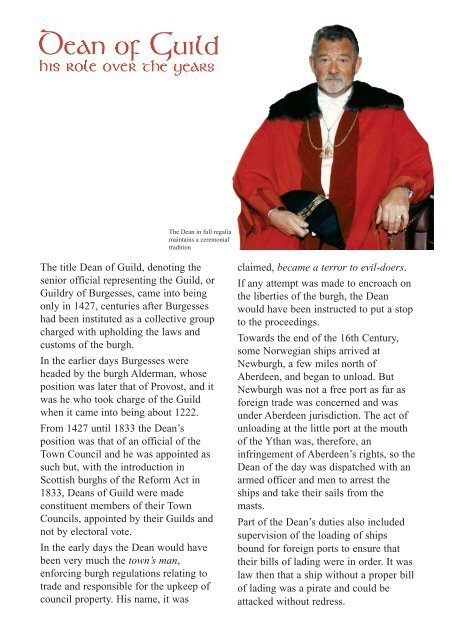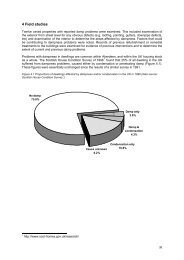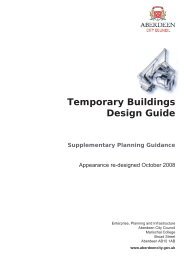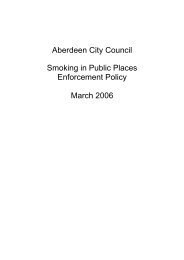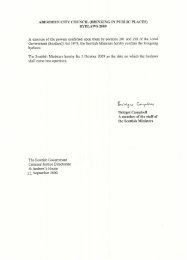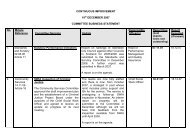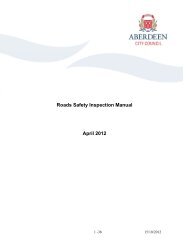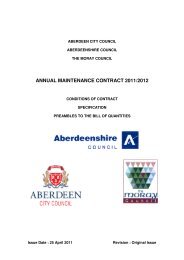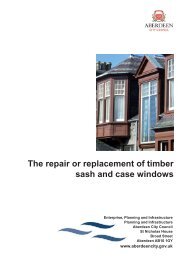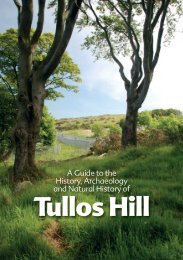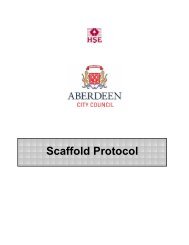he concept of the Burgess oath belongs - Aberdeen City Council
he concept of the Burgess oath belongs - Aberdeen City Council
he concept of the Burgess oath belongs - Aberdeen City Council
- No tags were found...
Create successful ePaper yourself
Turn your PDF publications into a flip-book with our unique Google optimized e-Paper software.
T<strong>he</strong> Dean in full regaliamaintains a ceremonialtraditionT<strong>he</strong> title Dean <strong>of</strong> Guild, denoting t<strong>he</strong>senior <strong>of</strong>ficial representing t<strong>he</strong> Guild, orGuildry <strong>of</strong> <strong>Burgess</strong>es, came into beingonly in 1427, centuries after <strong>Burgess</strong>eshad been instituted as a collective groupcharged with upholding t<strong>he</strong> laws andcustoms <strong>of</strong> t<strong>he</strong> burgh.In t<strong>he</strong> earlier days <strong>Burgess</strong>es were<strong>he</strong>aded by t<strong>he</strong> burgh Alderman, whoseposition was later that <strong>of</strong> Provost, and itwas <strong>he</strong> who took charge <strong>of</strong> t<strong>he</strong> Guildw<strong>he</strong>n it came into being about 1222.From 1427 until 1833 t<strong>he</strong> Dean’sposition was that <strong>of</strong> an <strong>of</strong>ficial <strong>of</strong> t<strong>he</strong>Town <strong>Council</strong> and <strong>he</strong> was appointed assuch but, with t<strong>he</strong> introduction inScottish burghs <strong>of</strong> t<strong>he</strong> Reform Act in1833, Deans <strong>of</strong> Guild were madeconstituent members <strong>of</strong> t<strong>he</strong>ir Town<strong>Council</strong>s, appointed by t<strong>he</strong>ir Guilds andnot by electoral vote.In t<strong>he</strong> early days t<strong>he</strong> Dean would havebeen very much t<strong>he</strong> town’s man,enforcing burgh regulations relating totrade and responsible for t<strong>he</strong> upkeep <strong>of</strong>council property. His name, it wasclaimed, became a terror to evil-doers.If any attempt was made to encroach ont<strong>he</strong> liberties <strong>of</strong> t<strong>he</strong> burgh, t<strong>he</strong> Deanwould have been instructed to put a stopto t<strong>he</strong> proceedings.Towards t<strong>he</strong> end <strong>of</strong> t<strong>he</strong> 16th Century,some Norwegian ships arrived atNewburgh, a few miles north <strong>of</strong><strong>Aberdeen</strong>, and began to unload. ButNewburgh was not a free port as far asforeign trade was concerned and wasunder <strong>Aberdeen</strong> jurisdiction. T<strong>he</strong> act <strong>of</strong>unloading at t<strong>he</strong> little port at t<strong>he</strong> mouth<strong>of</strong> t<strong>he</strong> Ythan was, t<strong>he</strong>refore, aninfringement <strong>of</strong> <strong>Aberdeen</strong>’s rights, so t<strong>he</strong>Dean <strong>of</strong> t<strong>he</strong> day was dispatc<strong>he</strong>d with anarmed <strong>of</strong>ficer and men to arrest t<strong>he</strong>ships and take t<strong>he</strong>ir sails from t<strong>he</strong>masts.Part <strong>of</strong> t<strong>he</strong> Dean’s duties also includedsupervision <strong>of</strong> t<strong>he</strong> loading <strong>of</strong> shipsbound for foreign ports to ensure thatt<strong>he</strong>ir bills <strong>of</strong> lading were in order. It waslaw t<strong>he</strong>n that a ship without a proper bill<strong>of</strong> lading was a pirate and could beattacked without redress.


